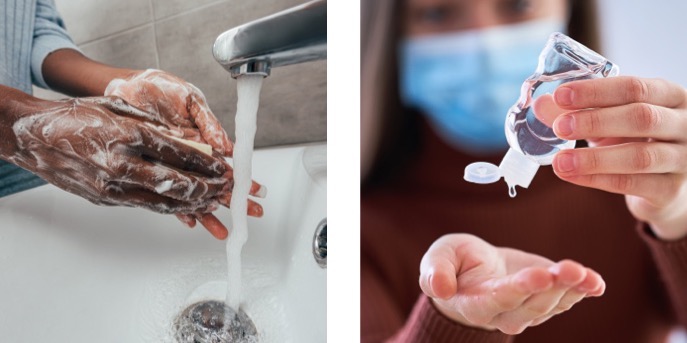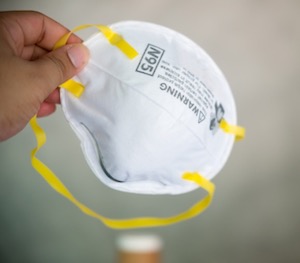It’s convention and trade show season again! We just wrapped up TISE in Las Vegas and Coverings is looming in Orlando, Fla. this month, with Total Solutions Plus in New Orleans coming up in October. It’s not unusual for industry members contract a bug at these events. Personally, I came home with a cold after Total Solutions Plus last fall, and brought COVID-19 back with me from TISE.
This begs the question – how do we stay healthy at these industry events? With about 400 people dying daily of COVID in the U.S. – and other viruses lurking – are there any measures we can take to boost our immunity? Should we all be wearing masks again? Avoiding handshakes or hugs? What can we do to give ourselves the best chance to only bring home inspirations, insights and new business relationships from conferences, and not an unwanted viral hitchhiker?


Docs weigh in
Dr. Robert A. Zorowitz, MD, MBA, CMD, Regional Vice President, Health Affairs, for the Northeast at Humana in New York, N.Y., said, “I think after spending two years+ protecting ourselves against COVID (and, therefore, other viruses), we’re being exposed to a variety of viruses, to which we don’t have the level of immunity we’d like. I’m not sure there’s a magic bullet – just the usual stuff. Wash hands, eat well, sleep well, etc.


“Most of us won’t avoid group events and won’t want to wear masks if we don’t have to, so some of this is just inevitable,” he added. “I suspect that after being around people for awhile again, it will happen less, although colds and other viruses are pretty difficult to avoid altogether.”
Dr. Sandra Gompf, Professor of Medicine, USF Health Infectious Diseases and International Medicine, concurred, noting that respiratory viral and bacterial infections can easily be transmitted by contact (hands and surfaces) and respiratory droplets (sneezing, coughing, loud talking). Besides COVID-19, colds, influenza, respiratory syncytial virus (RSV), and norovirus gastrointestinal illness are all spread the same way.


Heath Nay, MD, Albuquerque, said how stringent your precautions against illness depend on how much you want to protect yourself and how strong your immune system is. It ranges from “Boy in the Plastic Bubble status, to not caring or taking precautions,” he said. “And when it comes to viruses like coronaviruses, you have responsibility not just for yourself but for those you come in contact with.”
To vax or not to vax
Though COVID has evolved to be more virulent but less lethal, Nay said it’s a good idea to consider your general health status as well as any genetic predispositions to susceptibility for illness to establish your protection protocol.
And when it comes to COVID and influenza, vaccines are useful parts of your arsenal. “Keep up with the latest recommended CDC Immunization Schedule for your age group and personal risk factors (https://www.cdc.gov/vaccines/schedules/index.html), especially COVID-19 updated boosters and annual flu vaccines,” Gompf recommended.
“Getting a vaccine does not mean you will not get sick,” Nay explained. “It means the vaccines – and boosters – equip your immune system with an extra ‘bazooka’ to help fight the virus and keep you alive, and prevent your body from being overwhelmed by the replication of the virus. The reason there have been several boosters is because the virus has evolved, changed, mutated and the surface proteins developed by the prior vaccinations to disarm the virus no longer match the now-mutated virus.”
Break the chain of transmission
“The best way to prevent infections at gatherings is to break the common chains of transmission by contact and respiratory droplets,” Gompf said. “Every break in the chain adds protection.”
Nay agreed, “With a virus like HIV, you can stand right next to a person with it, but you will not catch it if you aren’t touching them,” he said. “With droplets that spread when talking, sneezing, coughing – you want to prevent contact with the droplets. If it gets on your skin, it STILL has to make its way to the mucous membrane in your mouth, nose and eyes to gain entrance.”


Our physicians agreed that distancing three to six feet away from others can help prevent the spread. So can washing your hands A LOT – with soap and water – or liberally using hand sanitizer that contains a minimum of 60% ethanol or isopropyl alcohol, making sure you get to all the spaces between your fingers, Nay said. Make a habit of doing this before eating and after using the restroom. If you feel a sneeze or cough coming, direct your expulsions into your elbow to capture the droplets and not spread them into the air.


While alcohol is a great thing to use on your hands, it’s not a great thing to consume if you want to stay well. “Drinking alcohol can weaken immunity, impair your judgment about precautions, and dehydrate you, which can make you feel worse if you do get sick,” Gompf said. Nay agreed, and pointed out caffeine also negatively impacts the immune system, so coffee and sodas are not great beverages for boosting your protection against illness.
It may be a no-brainer, but don’t touch your face – including your eyes – especially if you have been touching a lot of doorknobs, keyboards, or elevator buttons, Gompf said. Nay noted that coffee bars and buffets are notorious havens for illness-causing microbes.
And though I am not an expert – I’d recommend caution when using your phone. You shake hands, then answer that text or take a photo with your phone, rub your itchy eye and – bam!!!! You’ve just given a virus entrance into your body.


Other precautions include bringing sanitizing wipes for places you’ll be eating, and wearing a well-fitted mask in an airplane or in a crowd if you are at risk, especially indoors, Gompf said. Nay added that vitamin C is a good prevention measure, as is staying hydrated, getting fresh air and sunshine, and eating healthy.
But as Zorowitz noted, there is a learning curve for our immune systems to ramp up to desired protection level again after isolating over the last few years.
And Nay concluded, “The immune system has to be triggered in order to work. But catching stuff isn’t necessarily bad – it’s all about where you want to put yourself on the protective spectrum and how aggressive you want to be.”
Editorial Director and Senior Writer for TileLetter and TileLetter ARTISAN
Lesley Goddin has been writing and journaling since her first diary at age 11. Her journey has taken her through a career in publishing and publicity, landing her the editor position of TileLetter and its special publications in 2006. Her goal is to educate, inspire, recognize and encourage those in the tile industry -- especially the tile and stone contractor.








